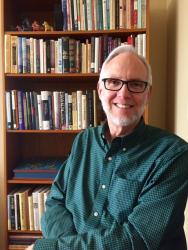
Main menu
- Board Members
- Store
- Course Faculty
- Mission and Partnership
- Online Learning
- Staff
- Synodically Authorized Ministry
- Study Materials (Free)
St. Paul: From Saul of Tarsus to the Apostle of the Lutheran Reformation
Dr. James Aageson, Professor Emeritus of Religion at Concordia College, Moorhead
This digital class was developed for the Northern Rockies Institute of Theology (Montana Synod ELCA) for continuing education for rostered ministers. It is also a class that can be used for motivated congregational study groups. A link to the study guide can be found at the end of the description. Once you have purchased the class, instructions will be sent on getting to the class site. You will be able to either stream or download the content. You do not have to view the class in one sitting but can return to the website as often as you want to view or review sessions. There are 12 video sections of around 20 minutes each.
Class Synopsis
Apart from Jesus, Paul is arguably the most important figure in the history of Christianity. Paul and his legacy have continually shaped, fed, and challenged the church from the first century to the twenty first. Paul’s letters form the theological heart of much of the New Testament, and along with the memory of his ministry they have continued to be read, preached, theologically interpreted, and applied to contemporary ethical issues. Notably, Luther himself found deep personal solace and profound theological insight in reading Paul’s letters. After the remembrance of the 500th anniversary of the Lutheran Reformation, it is fitting that we revisit Paul and the way he has come to be interpreted and reinterpreted over the decades and centuries. This course will focus on Saul of Tarsus, Paul the Jew and follower of Christ, Paul the revered figure of the second century church, and Paul the apostle of the Lutheran Reformation. By looking at these significant stages in Paul’s journey through the life of the church, we will gain renewed understanding and appreciation for the way Paul has been interpreted in the past and continues to be reinterpreted today.
Session Breakdown
Session I:
A. Introduction
- Paul and Judaism: An overview of recent scholarship and its implications for Lutheran readings of Paul
- Saul/Paul in his first century Greco-Roman context
Session II:
- Saul/Paul in his first century Greco-Roman context continued
- Saul as a first century Jew prior to the Damascus Road experience
- Paul’s experience on the Damascus Road and its meaning: a conversion or a call
Session III:
- The context of Paul’s mission and the fundamentals of his theology
- The Pastoral Epistles, Paul’s legacy, and the early post-Pauline church
- Ignatius of Antioch and Polycarp of Smyrna
Session IV:
1. Was there a Pauline ‘silence’ in the early church: Irenaeus and Tertullian?
2. Paul, Thecla, Marcion, and the Gnostics
Session V:
1. Luther, Paul, and their respective contexts
2. Paul’s legacy in the early church as a harbinger of things to come
STUDY GUIDE
Dr. James Aageson
Prior to his retirement, Jim Aageson was Dean of Arts and Sciences and Professor of New Testament and Early Christianity at Concordia College in Moorhead, MN. He is ordained in the ELCA and a member of the ELCA Convocation of Teaching Theologians. Jim has degrees from Pacific Lutheran University, Luther Seminary, Union Seminary in Virginia, and Oxford University. He also served parishes in Great Falls and Anaconda, MT.
Dr. Aageson’s academic interests focus on the history and thought of Early Judaism, Pauline studies, and early post-New Testament Christianity. His books include Written Also for Our Sake: Paul and the Art of Biblical Interpretation; In the Beginning: Critical Concepts for the Bible; Paul, the Pastoral Epistles and the Early Church; and Windows on Early Christianity: Uncommon Stories, Striking Images, Critical Perspectives. He has also contributed numerous articles to other books and journals. He has traveled extensively in Israel, Jordan, Egypt, Turkey, Greece and Italy, and he has taught in Greece. He is a member of the Society of Biblical Literature and the Catholic Biblical Association.
Questions & Comments
If you have further questions or comments about Select Learning theological materials, please contact:
Maria Rodas
maria@selectlearning.org
NOTE: Please include your church name and address. Thank you.
Newsletter Signup
Sign Up Now
For Email Newsletters you can trust.
Address
Select Learning
1068 Summit Avenue
South St. Paul, MN 55075
P: 877.675.6275
E: info@selectlearning.org
1068 Summit Avenue
South St. Paul, MN 55075
P: 877.675.6275
E: info@selectlearning.org

